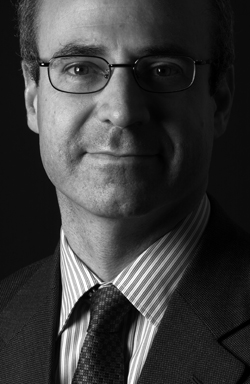 |
|
| Glimpses
William F. Browder, AB’85, is chief executive officer of Hermitage Capital Management. In April 1996 the Stanford MBA arrived in Moscow with “briefcase, cell phone, not a word of Russian,” and $25 million from international banker Edmund J. Safra. Today his firm’s Russia-dedicated public equity fund has $1.4 billion in assets, and Browder has a reputation as a corporate gadfly, going to bat for minority shareholders against the oligarchs who control Russia’s giant utilities. As Browder argues, it’s the American way. Genealogy of a career decision: I come from this unusual family—my grandfather [Earl R. Browder] was the general secretary of the American Communist Party, my grandmother’s Russian, and my father [Felix E. Browder, chair of Chicago’s math department in the 1970s and ’80s] and uncles were born in Moscow. When I earned my MBA, I decided I needed to find a job that was personally relevant. That was in 1989, the year the Berlin Wall came down, and I ended up becoming the first employee of the Boston Consulting Group’s Eastern European practice area, working out of the London office. From BCG bus-factory consultant to investor: I asked my translator what all the advertisements in the Polish newspapers were about. He explained that this one was for the privatization of a textile factory, for a bank, for a rubber company. I asked him to help me do the math, and it turned out that the evaluations on the companies were about half their previous year’s profits. No matter how many classes I’d overlooked in business school, I understood that was a good deal. So I took my life savings—about $4,000—and went down to the post office and signed over my traveler’s checks to buy shares in these first Polish privatizations. At that point I decided that my vocation had to be investing in privatization in Eastern Europe. Riding the Russian roller coaster to $1.5 billion by 1998 and down again: The storm clouds began to gather when the Asian currency started to devalue. My biggest career mistake was making a very articulate argument about how Asian currencies weren’t going to affect Russian stocks. My analysis said that there were no investment or trading links between Russia and Asia; therefore Russian stocks should be immune from Asian currency prices. I didn’t realize that the world is one big sea of liquidity, and if people lose money in one part of the world, they also sell securities in another part. That was a very costly lesson—we went down roughly 90 percent from peak to trough. How the gadfly learned to bite: When capital markets began to shut down, the oligarchs had no incentive not to misbehave—embezzlement, asset stripping, transfer pricing, share dilutions. To protect my economic interests I had to fight. My first fight was with Vladimir Potanin, who owned 96 percent of [the oil holding company] Sidanco; I owned 2 percent, and friends of mine owned 2 percent. Potanin organized a share dilution to triple the number of outstanding shares, with the new shares sold only to his group, at a 97 percent discount. Essentially, he was going to steal two-thirds of our stock. We went to war. Perhaps we won because I played by the American set of rules, using levers that any corporate-governance activist would use: the press, written laws, the regulators, and peer pressure. Since then we’ve been involved in nine major corporate-governance disputes. We invest in companies where we find things that are wrong and find levers that we can pull that make those wrong things stop. That creates an increase of value greater than one can get by being a passive shareholder. And a nice by-product is that we can also make Russia a better place. Why he shares his grandfather’s activist streak: It’s fighting the big guys for the little guys. It may not seem like we’re little guys as big investors but we’re the ones fighting for the minority shareholders. If there are people with advantages who are ruining things for other people, that’s what I’m working on. It’s a genetic thing. There’s a certain passion in being an activist, and it’s just as much my passion as his. |
|
phone: 773/702-2163 | fax: 773/702-8836 | uchicago-magazine@uchicago.edu

